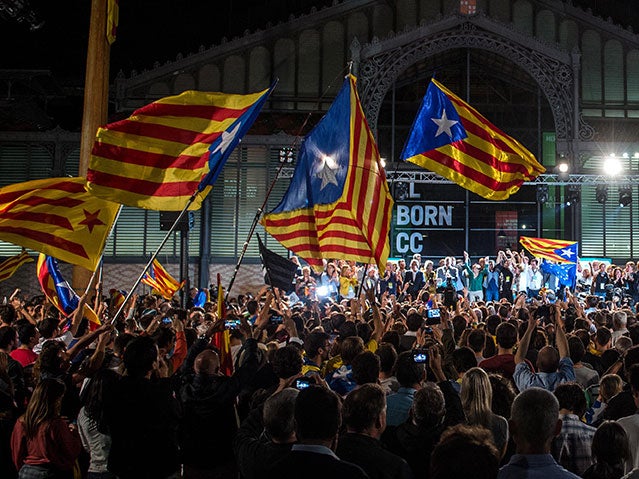Spain's Prime Minister Rajoy is the one who has unwittingly made Catalonia turn to independence
His strategy has been counterproductive; his stubbornness has hardened hearts; and his hope that Catalans wouldn’t feel confident in their right to challenge Spanish constitutional law will now be proved wrong


Last night in the centre of Barcelona, a political coalition who turned yesterday’s regional elections into a plebiscite on independence took to the stage to exuberant cheers. The results were in: the pro-independence parties had won a parliamentary majority. Speaker after speaker praised the high-turnout and positive campaign in front of the large crowd. The results, they proclaimed, had given them a mandate to begin the process of unilaterally declaring independence from Spain. This morning that process will begin. A constitution will need to be drafted and new judges hired. Today, Catalonia will start to build itself a state.
Spanish Prime Minister Mariano Rajoy must take credit for this widening split of Spain – even if he wouldn’t want to. According to the Centre for Opinion Studies, in 2010 just under 20 per cent of Catalans supported independence. By June 2015 this had nearly doubled to 38 per cent. This change in attitude began when a Spanish constitutional court declared there was no legal basis to recognise Catalonia as a nation. Legislation that would have permitted the northeastern region greater control of tax collection was also rejected. Catalonia would not receive any more powers and its nationhood would not be recognised any time soon.
In defiance of the rulings, 1 million Catalans that summer took to the streets demanding more autonomy – and from here the independence movement grew. Last year, 500,000 attended a march on September 11th, the National Day of Catalonia. This year that number was 1.4 million. An unofficial referendum was then held last year in which 2.3 million people voted (80 per cent of which voted in favour of independence). Apart from calling the process a “sham”, Rajoy did nothing but reaffirm his non-negotiating position.
Rajoy has stubbornly maintained an unyielding line ever since. This summer, Rajoy told reporters, “There will be no Catalan independence.” He also said, “There won’t be any plebiscite vote. We are talking about regional elections in which people will choose their regional parliament. Nothing else.”
By not offering a referendum, by refusing to even respond with a campaign to explore changing a constitution disliked by so many in his country, Rajoy has allowed the independence movement to gain a potentially unstoppable pace.
Rajoy’s inaction has exacerbated this problem. His decision to pursue a campaign based on fear has compounded it. Last week he was forced to cut a walk around a Catalan town short after being heckled in the street by pro-independence groups. He then chose to warn Catalans about their impending exit from the European Union, their fragile place within the business community and even the raise the question over their continued nationality as Spanish citizens. In fact, he became unstuck in an interview on this topic on Tuesday after having to admit that Catalans wouldn’t lose their nationality upon leaving Spain should they wish to keep it. His opponents were watching. They used the clip in the final campaign piece, leaving Catalans with the message, “They lied about your nationality. The other threats are also false.”
Support for Catalan independence peaked, and began to fall, in November 2012 at 48.5 per cent. Rajoy’s nightmare final week of campaigning helped resuscitate it, just in time for yesterday’s vote. His five-year strategy based on non-engagement has been so counterproductive that it hasn’t just strengthened the movement against him but it has pushed moderates into the arms of the independence campaign.
The Spanish Prime Minster has believed that this independence campaign would disappear. His strategy has been counterproductive; his stubbornness has hardened hearts; and his hope that Catalans wouldn’t feel confident in their right to challenge Spanish constitutional law will now be proved wrong. Spain is heading for a constitutional and political crisis. Emboldened by leaders who appear to be defending their rights, Catalonia last night presented Madrid with a mandate from its citizens it would be even more foolish to ignore.
Join our commenting forum
Join thought-provoking conversations, follow other Independent readers and see their replies
Comments